 DC Comics
DC ComicsOctober 1999
Writer: Tom Peyer
Penciller: Rags Morales
Inker: David Meikis
Hourman didn't last long: it ran for only two years, and has yet to be collected in trade paperback form. It's the quintessential modern cult classic. What made Hourman work was the team-up of two of comic's most expressive creators, Tom Peyer and Rags Morales.
I have gone on at length before about the high esteem I hold Morales in, but to hit on it again, briefly: no one in comics is better with emotion, and his facial expressions bring a whole different level of 'performance' to his characters than most other artists in comics today. In Hourman especially, though, Rags is having a blast. Big, bold layouts. Figures flying though panels and out of windows. Hourman was a playground for Rags, a showcase for his playful nature.
Same can be said for Peyer's writing on the series. Few series have ever been as unpredictable as Hourman was, literally anything could and did happen. Hourman, essentially, was a Pinnochio story where the puppet stayed a puppet. Tagging along beside him, playing Jiminy Cricket, was Snapper Carr, disgraced former JLA groupie.
Peyer also brought with him great pathos and understanding of what it is to be human: a never ending struggle between wants and needs. It is that sense of eternal longing that makes The Human League so special.
Amazo, an android with the ability to absorb the powers of any superhero he faces, now has the ability to literally steal the humanity from his victims and leave them, in Snapper's words, "humming like a refrigerator." He has already done this to the entire JLA, who are now dispassionate robots.
Amazo is handling his newfound humanity with the grace and subtlety of any newborn: He's a mewling, puking mess; grabbing every sensory distraction near him.

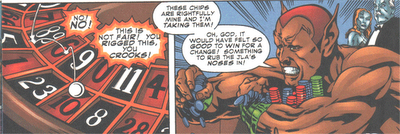 Amazo is a bull in a china shop, a being of unlimited power who cannot cope with his newfound emotions. Overriding, though, is his guilt and shame. But when he can't deal with the shame, he rages.
Amazo is a bull in a china shop, a being of unlimited power who cannot cope with his newfound emotions. Overriding, though, is his guilt and shame. But when he can't deal with the shame, he rages. 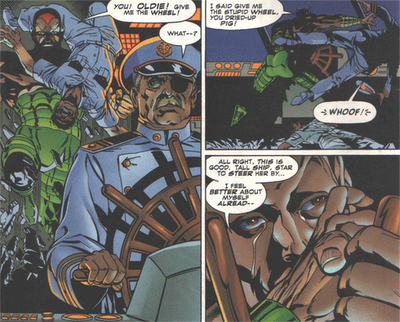 Peyer makes you believe his transformation not because of the wrath or because of the shame, but because Amazo experiences them simultaneously.
Peyer makes you believe his transformation not because of the wrath or because of the shame, but because Amazo experiences them simultaneously. The JLA, now androids, show up to stop him, and he throws a crew man into he ocean to distract them. "He presumes that endangering an innocent will divert our attention," says android Superman, "His presumption is inaccurate."
It is Amazo himself that saves the man, screaming in anguish, "What have I done?", and diving into the ocean after him.

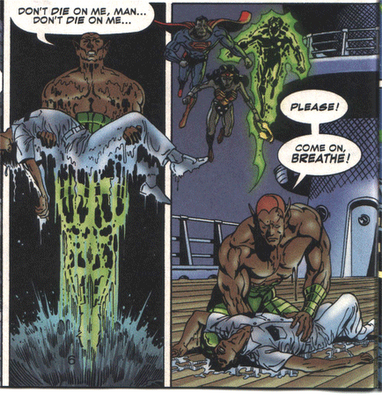 "It's human to regret one's actions," Amazo tells the confused JLAndriods, "I feel great compassion for this man--but I still have none for you." With that he snares them in a net and drags them below the water. He takes him to his lair, where he bombards their circuitry with self-contradicting stimuli: Baby Hitler, planes dropping flowers instead of bombs.
"It's human to regret one's actions," Amazo tells the confused JLAndriods, "I feel great compassion for this man--but I still have none for you." With that he snares them in a net and drags them below the water. He takes him to his lair, where he bombards their circuitry with self-contradicting stimuli: Baby Hitler, planes dropping flowers instead of bombs.  "A terrible way to go, I know, but if you want a job done cruelly, give it to a human!" says Amazo.
"A terrible way to go, I know, but if you want a job done cruelly, give it to a human!" says Amazo. Meanwhile, Hourman is having a crisis of faith. Snapper, his "humanity coach", has been turned into an android, not even phased by the fact that his poor little kitty Starro has been knocked out by Amazo's attack in the previous issue. It's finally by accepting his unhumanity that he succeeds, using a modem signal to locate the JLA, and souping himself up into a battle tank to take out Amazo.
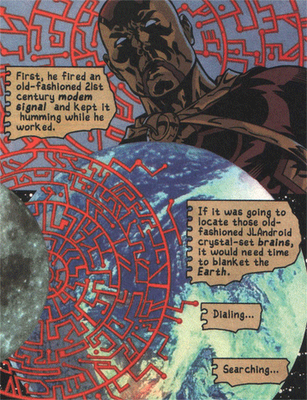
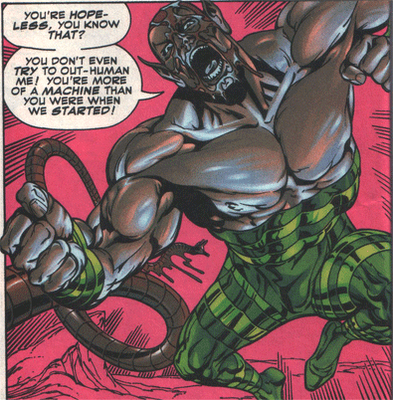 "You can add options and extras until you're big as the moon, but you'll never match my complexity! I have feeling ! Free will!" screams Amazo, charging towards Hourman. With a giant WHONK, Hourman knocks him out.
"You can add options and extras until you're big as the moon, but you'll never match my complexity! I have feeling ! Free will!" screams Amazo, charging towards Hourman. With a giant WHONK, Hourman knocks him out.
His humanity restored, Snapper asks Hourman if what Amazo said about him not being human bothers him.
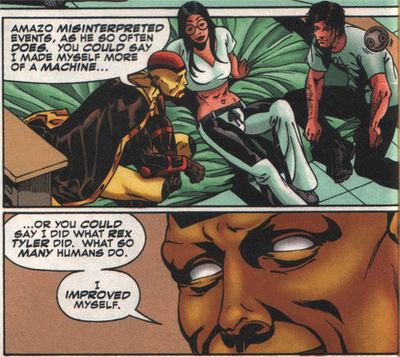
The issue ends with Hourman speeding off to his next breathless adventure, and the series ultimately ended that way.
When Hourman 'unmakes' Amazo, it is in one way his first act of compassion. Not just to bring back the JLA and his friends, but to ease Amazo's own suffering. It is that same compassion that sends him into battle with Amazo at series' end; this time overtly to save him from himself.
Hourman's book was a joy, a touch of Silver-Age goodness with a modern twist. That sense of fun and adventure is rarely seen in comics anymore, and when it is it should be celebrated.

1 comment:
Baby Hitler! I'd forgotten that bit. I really think Tom Peyer could bring something to DC or Marvel that nobody else is capable of -- I could see a Doom Patrol series -- but I don't know if he's interested in getting back in the game right now.
I found a nice little obituary for the Hourman series here -- but watch out, it has a vicious pop-up:
http://www.fortunecity.com/tatooine/niven/142/tomb/tm02.html#
Post a Comment